Love Japan: Recipes from Our Japanese American Kitchen, written by Sawako Okochi and Aaron Israel with Gabriella Gershenson, features over 80 comforting dishes for the home cook and gorgeous photography. A few highlights include Kale Salad with Carrot-Ginger Dressing, Japanese Garden Pizza, Mentaiko Seafood Spaghetti, Home-Style Matzoh Ball Ramen, and Strawberry Shortcake. I will also be sharing their recipe for Tamago Sando (Egg Salad Sandwich) following the review.
Disclosure: I received this book from Ten Speed Press in exchange for my honest review. All comments and opinions are my own.

Sawako Okochi and Aaron Israel
Sawako Okochi is the co-chef and owner of Shalom Japan in Brooklyn, New York. She grew up in Hiroshima, Japan and moved to Denton, Texas in 1995 to go to college.
She went to culinary school in New York and has worked at Chanterelle, Annisa, The Good Fork, and produced the Otakara Supper Club. Sawako has also been featured in Women Chefs of New York and The Jewish Cookbook.
Aaron Israel is also the co-chef and owner of Shalom Japan. He grew up in Long Island and attended art school at the Maryland Institute College of Art.
He has been featured in the New York Times, the New Yorker, New York magazine, The Jewish Cookbook, and more publications.
Love Japan
Sawako and Aaron begin Love Japan with their life together and how they developed idea behind the book by focusing on the meals they make at home in their Japanese American kitchen.
For those new to cooking with Japanese ingredients, they have put together a guide for pantry and kitchen staples, produce, and equipment with descriptions, photos, uses, tips, and storage information.
They even break down the different types of tofu and miso and other topics such as cooking noodles and assembling a hot pot (with diagrams!).
Chapters are divided according to the following: Basics, Breakfast, Vegetables, Pancakes and Friends, Sandos, Noodles, Hotpot and Tabletop Cooking, Fish, Poultry and Meat, Rice, and Dessert. The contents have a list of the included recipes with page number for easy reference.
The photography is provided by Yuki Sugiura. May of the recipes are paired with a quarter to full page photo of the finished dish. I especially love the attention to detail and step-by-step photos to demonstrate techniques such as molding Onigiri, wrapping Temaki, and rolling Tamagoyaki.
Measurements are listed in US Customary. Titles are written in English and Japanese. Each recipe includes a headnote with background information, yield, active/total cooking time, personal stories, and helpful notes.
Tamago Sando (Egg Salad Sandwich)
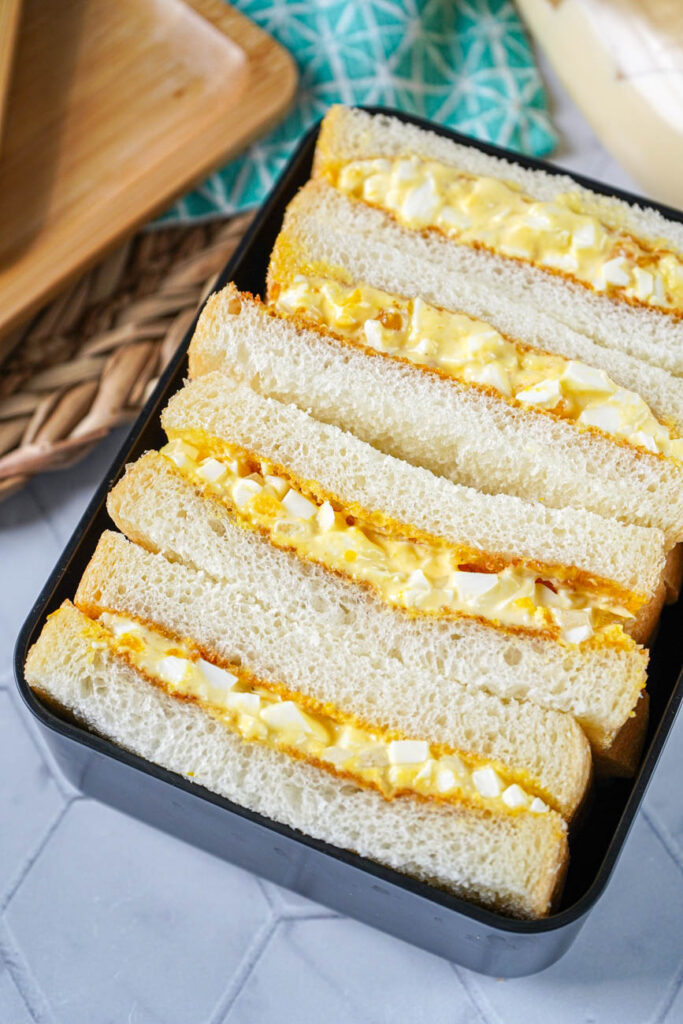
There is such an incredible variety of recipes in the sandwich section and I can’t wait to try them all. We went with the Tamago Sando (卵 サンド, たまごサンド) first.
This easy and comforting sandwich comes together in about 20 minutes. There are also only a handful of ingredients, so use the best quality possible.
To assemble, first boil the eggs in water for 9 minutes, until just shy of hard-boiled. Rinse well in cold water to stop them from continuing to cook and peel once cool enough to handle.
Finely chop the peeled eggs and combine with the mayonnaise, onion, salt, pepper, and small splash of rice vinegar.
Spread about 1/2 cup of the egg salad over the toasted Shokupan side, then cover with the toasted side of the other slice to assemble the sandwich.
Cut in half crosswise to serve. Refrigerate for up to a few hours if not eating immediately. The toasted sides of the bread will help act as a barrier against the egg salad to keep the bread’s texture more firm.
A Few Notes
Aaron mentions they always get the egg salad sandwich from Lawson when in Japan. We will actually be in Tokyo soon and I have already mapped out the closest one to our hotel to try it in person!
I have come across Tamago Sando with both the crust on and off. All the sandwich recipes in this book keep the crust on and toast one side of the slices to help act as a barrier between the fluffy bread and interior.
They have added about 1/4 cup diced onion to their egg salad. It adds such a wonderful flavor.
The exact amount of egg salad used in each sandwich may differ slightly based on the size of the bread.
Very gently add the eggs to the pot of water to keep them from cracking.
Notable Ingredients
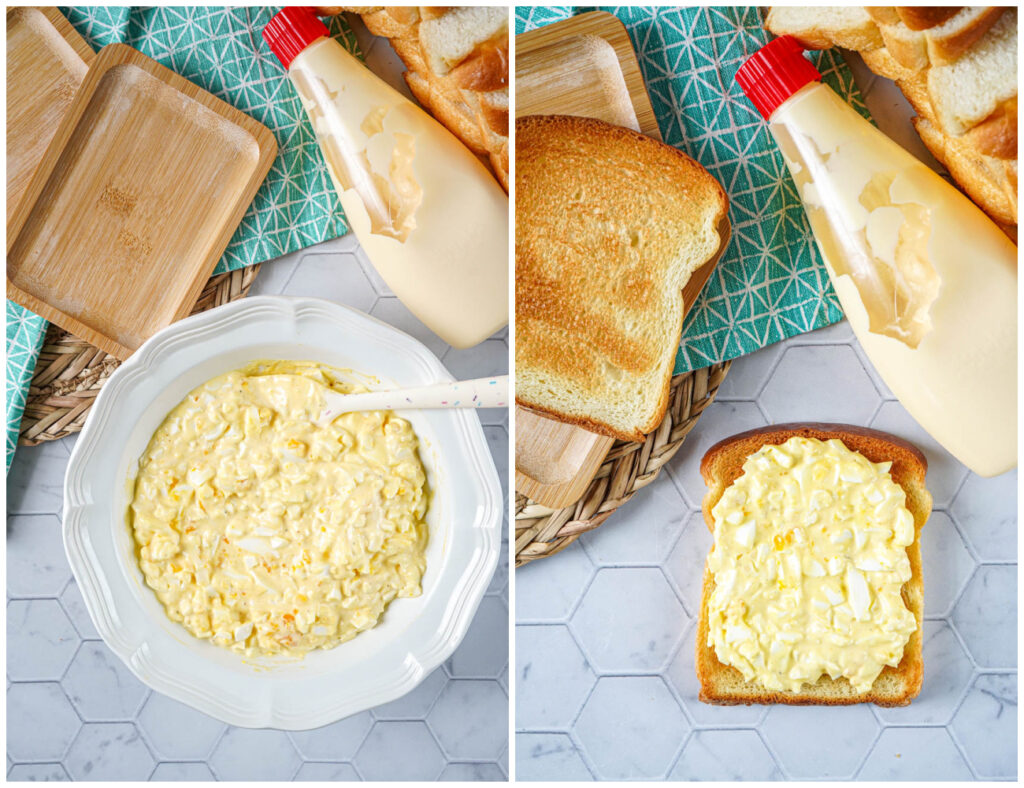
This recipe is best with Japanese-style mayonnaise. For those in Northern Virginia, I was able to find it at Lotte Market in Chantilly.
Shokupan (Japanese Milk Bread) is used as the base for the Tamago Sando. I picked up a loaf from a local bakery, but Sawako and Aaron have included recipes for both Shokupan and Rakkenji Shokupan in the book along with a deli rye variation.
Other Dishes
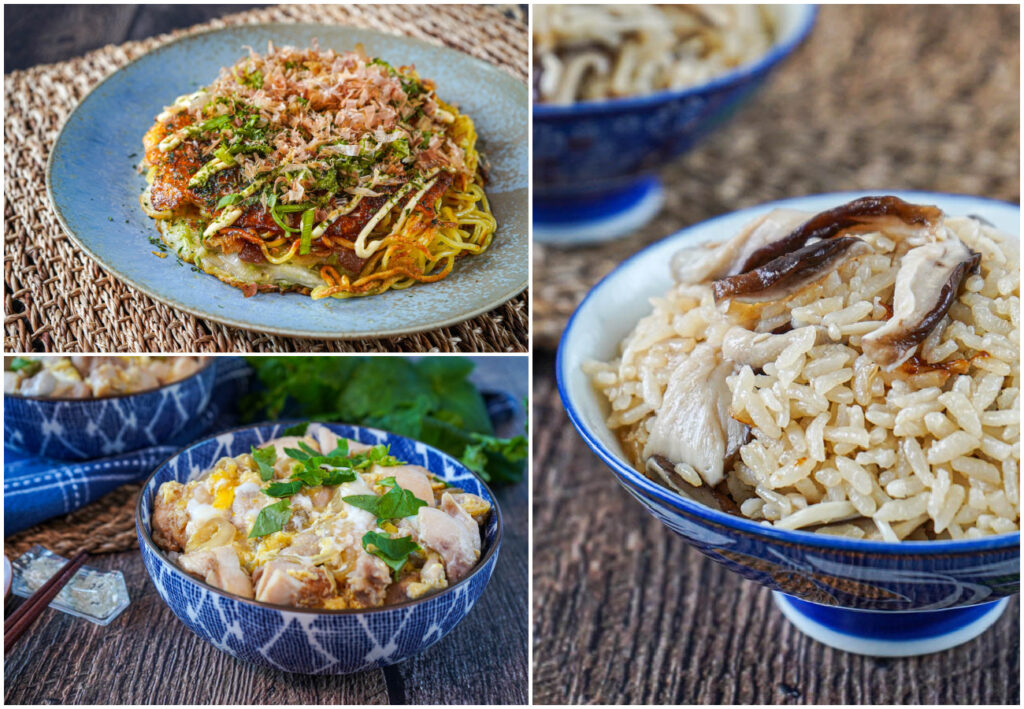
I also made Hiroshima-Style Okonomiyaki with Ramen Noodles), Spaghetti Napolitan (Ketchup Pasta with Bacon and Onions- not photographed), Oyakodon (Chicken and Egg over Rice), and Mushroom Rice.
I was so so unbelievably excited to see the recipe for Hiroshima-style Okonomiyaki in the book and had to make it immediately. We first tried it while living in Torrance when Chinchikurin Hiroshima Okonomiyaki opened up a couple of miles from our house and I’ve been missing it since moving away last year. A thin, crepe-like batter (this recipe mixes in the cabbage, bean sprouts, and onion for less prep) is topped with pork belly, crispy ramen noodles, fried egg, Okonomi sauce, mayonnaise, scallions, aonori, and bonito flakes for quite the incredible meal.
The Spaghetti Napolitan (Ketchup Pasta with Bacon and Onions) is such a fun and comforting dish perfect for the whole family. Spaghetti noodles are tossed in a sweet/savory ketchup-based sauce with thinly sliced bell peppers, onion, and pieces of bacon.
Oyakodon (Chicken and Egg over Rice) is one of my favorites and another I was excited to see in the book. Tender pieces of chicken are paired with barely set eggs simmered in a Dashi-based broth and served over rice.
The Mushroom Rice was the easiest recipe of all (particularly if you have a rice cooker) and a wonderful way to use up a combination of mushrooms. Simply add the washed rice to the rice cooker with a little soy sauce and other seasonings, top with the mushrooms, and press the white rice button to cook until tender and fluffy. They have also provided stovetop instructions.
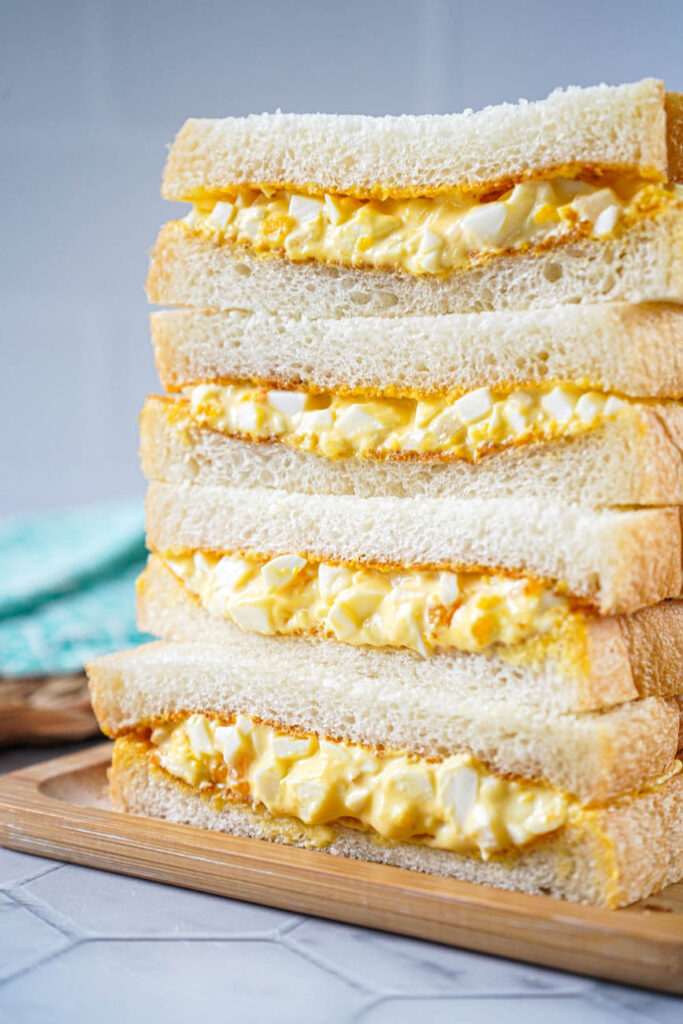
Love Japan is a fantastic option of those interest in Japanese American cuisine. Nearly everything I tried came together in less than 30 minutes. There is a wonderful variety of recipes for every time of day and throughout the year.
Many of the ingredients can be found in larger American grocery stores. Having a market with Japanese and East Asian items will be helpful in locating shiratamako, kokuto sugar, adzuki paste, matcha, gobo, nori, ikura, kombu, daikon, sushi grade fish, shiso, aburaage, fresh ramen noodles, and more.
For those in the DC area, I have been able to locate many of these ingredients at Maruichi Japanese Grocery in Rockville, Maryland. I haven’t stopped by yet since moving here (on my list!), but DC also has Hana Market.
For those in Los Angeles, I have been able to locate nearly everything at the Mitsuwa and Tokyo Central locations in Torrance/Gardena.
Tamago Sando (Egg Salad Sandwich) Recipe
Excerpt from Love Japan
Tamago Sando (Egg Salad Sandwich)
Ingredients
- 8 eggs
- 2/3 cup Kewpie mayonnaise
- 1/4 cup finely diced onion
- 1/2 teaspoon rice vinegar
- Pinch salt
- Freshly ground black pepper
- 8 slices Shokupan, Rakkenji Shokupan, or your favorite sandwich bread toasted on one side
Instructions
- Bring a small pot of water to a boil over high heat.
- Add the eggs and let the water come back to a boil.
- Reduce the heat to medium and cook for 9 minutes. The eggs will be just shy of hard-boiled. Drain, then run under cold water to stop from cooking further.
- Once cool enough to handle, peel the eggs, then finely chop.
- Place in a bowl with the mayonnaise, onion, vinegar, salt, and pepper and mix to combine.
- Lay 4 slices of bread on a cutting board, toasted-side up.
- Divide the egg salad evenly among them, about 1/2 cup each, and spread in an even layer.
- Top with another slice of bread, toasted-side down.
- Cut in half crosswise and serve.

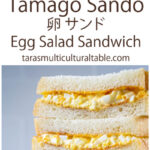

Leave a Reply